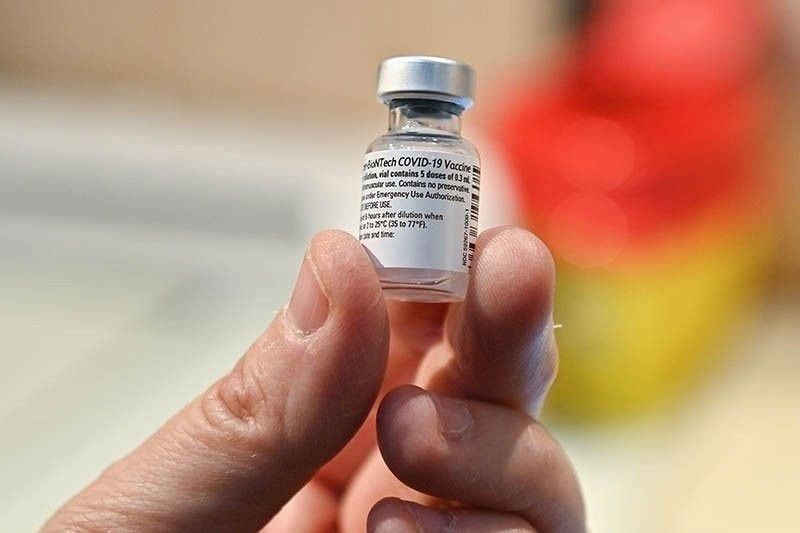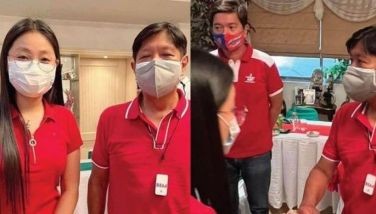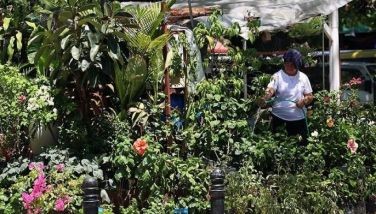1 million bivalent jabs from COVAX arriving in March

MANILA, Philippines — Around one million doses of bivalent COVID-19 vaccines from the COVAX Facility are expected to arrive in the country by the end of March, the Department of Health (DOH) said.
“Just last week, we have finalized the commitment of COVAX to donate bivalent vaccines to the country. So, by the end of March, hopefully, we expect the initial doses to arrive,” said DOH officer-in-charge (OIC) Maria Rosario Vergeire at yesterday’s press briefing.
“That would be part of the COVAX commitment to us,” said Vergeire.
“We are also currently coordinating with other countries that offered donations of bivalent vaccines. There is this one country that already confirmed commitment and we are just finalizing their delivery date,” she added.
The health official said they can’t disclose which country yet until negotiations have been finalized. “Once the agreement is signed, we will be informing everyone,” Vergeire said.
She added, “At the same time, in parallel, we are trying to explore how we can be able to procure and have this faster procurement to supplement these donations.”
Earlier, the DOH said it is in talks with vaccine manufacturers Pfizer and Moderna for the provision of bivalent jabs in the Philippines.
Vergeire said that “these bivalent vaccines will be part of the government’s vaccination program for COVID-19, so there will be both monovalent and bivalent vaccines that our government will be providing.”
As to who will be prioritized in the use of bivalent vaccines, the DOH OIC said it will depend on the quantity that the country will receive.
“This is the reason why vaccination of monovalent vaccines has been continuing since there is still evidence that it still works in preventing serious and complicated COVID-19 cases,” said Vergeire.
The DOH said they will be using a survey conducted earlier as basis for the bivalent vaccine procurement. The survey reportedly showed those who have received the first boosters already are very much interested to receive this bivalent vaccine.
However, the DOH said that, initially, it will only purchase a limited amount to prevent vaccine wastage.
OIC ready
Vergeire said she is now ready to play the role of department secretary once the post is offered to her.
“For the past six months, I’ve experienced going to the ground. I was able to talk to different groups and to work with different people. I’ve seen a lot of opportunities that I can change and lead reforms with. So, when I saw these things, I said, this would convince me to really take on the position,” she said.
Vergeire though clarified, “It will go through a process and I will discuss this with the President that I’m now ready, and if and when, that would be his decision.”
She first served as Assistant Secretary of the DOH in July 2015. It was last July 2022 when Vergeire was appointed OIC by President Marcos.
Still a public health emergency
The DOH said that scarcity of reports from different countries worldwide has prompted the World Health Organization (WHO) to declare that COVID-19 still remains to be a public health emergency of international concern (PHEIC).
Vergeire said, “If you would read WHO risk assessment before they arrived on their position on COVID-19 still being a public health emergency, they specifically stated that one of the reasons that they need to continue on with this public health emergency of international concern is that they are not able to clearly analyze the situation because of the scarcity of reports or data submitted by countries nowadays.”
She added, “This is true not just in the Philippines but also in other countries wherein they use more of antigen tests now as well as self-test kits in their homes and these, most often, are not reported.”
Vergeire said, “We understand why the WHO came up with this decision to continue on with the public health emergency status across the globe.”
The health official pointed out that one of WHO’s reasons for this is that the latter has observed an increase in the number of deaths worldwide.
“They have recorded that there are 10,000 to 30,000 deaths per day across the globe and that they are comparing it with the previous months that showed lesser number of deaths,” added Vergeire.
At the same time, the DOH OIC said that variants continue to mutate.
“Every two weeks, a new variant emerges. We have this new variant coming from China. There are also new variants detected in the United States. These new variants are now the subjects of studies by experts,” Vergeire said.
‘Manageable’
Vergeire said the situation in the Philippines is different from the global assessment of the WHO.
Even as the WHO retains the state of PHEIC, she said, “Our cases are already manageable. Our citizens have adopted good behavior of wearing masks. Our vaccination, although we have low booster rate, we are at 94 percent in our primary doses.”
Vergeire added, “We are better prepared than before. We can say that our cases here are manageable.”
The DOH official said the Philippines can veer away from some health protocols that are still being adopted in other countries.
“This is especially since the WHO’s statement only serves as a ‘form of guidance’ to countries. It doesn’t have to be just because WHO declared that there is still a public health emergency, that our status should still be the same,” said Vergeire.
She also pointed out that all concerns of the WHO are adequately addressed in the Philippine setting.
“Our COVID-19 responses are already institutionalized. These include our surveillance efforts, genome sequencing and case monitoring. We don’t need a public emergency or state of calamity declared for that,” she added.
Meanwhile, the DOH should waive the existing vaccine non-disclosure agreements (NDA) on COVID vaccines in the name of transparency, as the NDAs with private manufacturers have “outlived their purpose,” Sen. Risa Hontiveros said.
The statement comes a day before the Senate holds an executive session to discuss the information stipulated in the NDAs.
“At this point, COVID vaccine NDAs are useless and have outlived their purpose on the ‘price competition’. It is now simply a violation of the public’s right to know how our money was spent. NDAs should no longer stand in the way of accountability and transparency,” she said.
Hontiveros said that after an approximate 44 million vaccine wasted, it is “high time” the real cost is disclosed to the public.
“There is too much unnecessary secrecy surrounding this. The price of the vaccine should not be considered a state secret because public money was used to buy it. These NDAs only cripple the COA (Commission on Audit)’s mandate to investigate whether we got the most out of the billions of pesos we released during the pandemic,” Hontiveros said in a mix of Filipino and English.
Hontiveros then thanked the DOH for submitting initial documents so that COA could begin its audit. However, she flagged the fact that the submission only covered the loan agreements with Asian Development Bank (ADB), the World Bank and those with limited permissions from select vaccine manufacturers like Pfizer and AstraZeneca.
“What about the agreements with other vaccine manufacturers, like Sinovac? The previous administration bought bulk vaccines from Sinovac for the national vaccination program. How will the COA conduct a complete audit if the companies continue to hide behind the NDA clause of the contract?” she asked.
“If we allow this to happen now, it is precedent-setting. Maybe in the next pandemic, it will happen again, and it is possible that it will be abused,” she added.
The senator also said that this non-compliance of foreign vaccine manufacturers with the country’s government processes is “alarming.”
“Can the private sector undermine our Constitution just because they have an NDA on government contracts? Of course not. It is time for the vaccine manufacturers to cooperate with the COA audit,” she said.
“I stand by my call to completely release all information with regards to the COVID-19 vaccine procurement to the public. I have been saying this for over a year. There is no reason for this to be done behind closed doors. We deserve to know how every centavo was spent, especially during this recession. Those who should be held accountable, and don’t hide behind the NDA,” she added. – Cecille Suerte Felipe
- Latest
- Trending



























